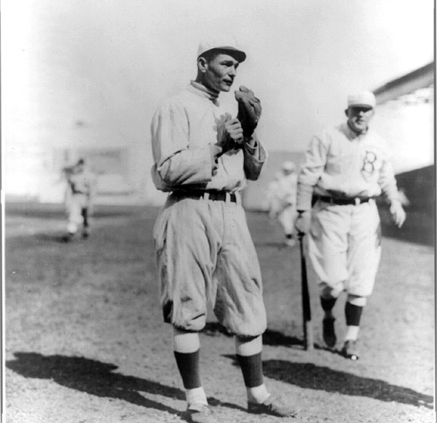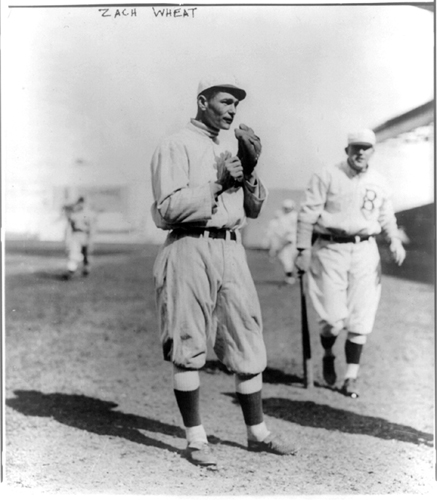October 10, 1916: Robins stave off Red Sox comeback, climb back into Series
Hall of Famer Zack Wheat played for Brooklyn for 18 years (1909-1926) and more than a century later still held Dodgers career records for most hits (2,804), total bases (4,003), doubles (464), and triples (171). (Photo: Library of Congress)
After one-run wins against the Brooklyn Robins in Games One and Two of the 1916 World Series, the Boston Red Sox held a 2-0 lead going into Game Three at Ebbets Field in Brooklyn. Playing at Braves Field in Boston, whose capacity was almost twice that of Fenway Park, the Red Sox had hung on for a 6-5 win in Game One in front of 36,117 fans.1 Boston took a 6-1 lead into the ninth thanks to five extra-base hits and four Brooklyn errors, but the Robins finally solved Boston starter Ernie Shore in the top of the ninth and scored four runs before Carl Mays got the final out to preserve the win.2
Game Two featured an epic pitchers’ duel between Red Sox southpaw Babe Ruth and Robins lefty Sherry Smith, both of whom threw more than 13 innings in a 2-1 Boston win. The crowd of 47,373 watched Ruth allow a run in the first inning when center fielder Hi Myers circled the bases for an inside-the-park home run and Brooklyn was up 1-0 after only three batters. That was all the Robins would muster off Ruth, who allowed only five more hits over his final 13⅓ innings before the Red Sox plated the winning run in the bottom of the 14th for a hard-fought 2-1 victory.3
Brooklyn’s Game Three hopes rested on the shoulders of Colby Jack Coombs, former Philadelphia Athletics star hurler who went 59-21 with a 2.39 ERA for the A’s in 1910-1911, and then went 4-0 with a 2.49 ERA in five fall classic starts to help Philadelphia cop back-to-back championships.4 He won another 21 games in 1912, but almost died of typhoid fever in 1913 and had to miss almost all of the 1914 season while he recovered. Philadelphia released Coombs in 1915 and he signed with Brooklyn, for whom he came back with a 15-10 season followed by a 13-8 mark in 1916 with a 2.66 ERA in 159 innings.
Red Sox manager Bill Carrigan countered in Game Three with right-handed submariner Carl Mays, who had gone 18-13 with a 2.39 ERA in 44 games. Mays faced two batters in the top of the ninth in Game One and earned a save, but Game Three would mark his first postseason start.5 According to the Boston Post, Mays was “the very man whom the experts selected as the most baffling problem that the Brooklyn batters would be called upon to solve.”6 Some felt lefty Dutch Leonard should have gotten the start, but Carrigan preferred to save his second-best hurler from pitching in a “cold raw atmosphere” with a “chilling wind.”7
Harry Hooper almost homered to lead off the game, but a stiff wind blew his drive to right field foul just before it cleared the wall, and he flied out to left on the next pitch. After Hal Janvrin grounded out, Chick Shorten singled to center and Dick Hoblitzell singled to right, but right fielder Casey Stengel threw Shorten out at third to end the inning.
Mays hit Myers to begin the bottom of the first, Jake Daubert laid down a bunt that Mays misplayed into a hit, Stengel sacrificed the runners to second and third, and Mays intentionally walked Zack Wheat to load the bases. George Cutshaw grounded to first and Hoblitzell fired to catcher Pinch Thomas to force Myers at home, and then Mays struck out Mike Mowrey to end the threat. In the Red Sox second, Coombs set down Duffy Lewis, Larry Gardner, and Everett Scott, the latter driving a ball that Wheat hauled in after a long run; Mays had an equally easy inning, getting Ivy Olson to ground to Scott, fanning Otto Miller on three pitches, and coaxing another grounder to Scott by Coombs.
Coombs allowed a two-out single to Hooper in the top of the third, but Miller threw Hooper out trying to steal second. Brooklyn took a 1-0 lead in the bottom of the frame when Daubert singled to right, Stengel poled a hit to left, and Cutshaw’s single to right plated Daubert. The Red Sox continued to be aggressive in the fourth. Shorten followed Janvrin’s fly to Stengel with a hit to left and tried to steal second, but Miller gunned him down and Coombs got Hoblitzell on a fly to Myers to end the inning.
The Robins doubled their lead in the bottom of the fourth and went up 2-0. Olson dropped a bunt toward third to lead off the inning. Gardner fielded the ball cleanly, but threw wildly to first and Olson advanced to second on the error. Miller sacrificed Olson to third and Coombs helped himself out with a run-scoring hit to right. Myers bunted Coombs to second before Daubert grounded out to Scott to send the game to the fifth.
Coombs continued his mastery over Red Sox batters in the fifth and set down Lewis on a liner to left, Gardner on a popup to third, and Scott on a grounder to the mound. The Robins added two more runs in the bottom of the frame on free passes to Wheat and Mowrey, the latter of which had Carrigan argue with umpire Hank O’Day to no avail, and a long two-run triple by Olson that just missed going out of the park. Mays retired Miller on a grounder to Scott, but that marked the end of his day. “The story of Mays’ transgressions is a rather gloomy one to Boston fans,” wrote the Boston Post’s Paul Shannon. “In contrast with yesterday’s game this contest was a big disappointment.”8
Boston finally broke through with two runs in the top of the sixth to cut Brooklyn’s lead in half. Hitting for Mays, Olaf Henriksen drew a one-out walk. Hooper followed with a tremendous drive to right-center field that went for a triple and Shorten singled Hooper home with the second run to make the score 4-2. Carrigan turned to 14-game winner Rube Foster to start the sixth and the right-hander found himself amid controversy almost immediately. He retired Coombs and Myers on a lineout and pop fly, respectively, but Daubert lashed a drive down the left-field line that rolled to the fence 400 feet from home plate.
He rounded the bases and headed for home. Lewis recovered the ball and fired to Scott, who threw to Thomas just in time for Thomas to apply the tag, but O’Day called Daubert safe. Thomas immediately called attention to his blocking of the plate and Daubert’s positioning that showed he could not have touched the plate, and O’Day reversed course and called Daubert out. The crowd erupted in boos as the Robins surrounded O’Day in protest, but the arbiter held his ground and the score remained 4-2.
That lost run loomed large when Gardner belted a Coombs offering over the right-field wall with one out in the seventh to bring Boston to within one at 4-3. Coombs signaled to manager Wilbert Robinson that he was through for the day and Brooklyn’s skipper called on ace hurler Jeff Pfeffer, who had won 25 games and pitched to a 1.92 ERA during the regular season, and pitched one inning of relief in Game One.
Pfeffer was brilliant and retired all eight batters he faced, striking out three to earn a save in Brooklyn’s 4-3 win. Foster wasn’t as dominant but equally effective with three innings of scoreless work, albeit in a loss that pulled the Robins to within one game of tying the series at two games apiece.
“The bright colors of the Boston Red Sox champions were lowered by National League men from Brooklyn this afternoon,” waxed T.H. Murnane after the game, “and the fans of Ebbetsville are a happy lot tonight, for they hardly hoped to see their team win even one game from the skillful men from Boston.”9
SOURCES
In addition to the sources cited in the Notes, the author accessed Retrosheet.org, Baseball-Reference.com, and SABR.org.
NOTES
1 Braves Field had a listed capacity of 45,000 while Fenway Park’s was 24,000.
2 Shore might have gotten out of the ninth unscathed when he coaxed a one-out bases-loaded grounder out of Mike Mowrey that Red Sox second baseman Hal Janvrin turned into a two-run error instead of getting at least one out and possibly a double play.
3 Sherry Smith allowed the winning run with one out in the bottom of the 14th and finished the contest with 13⅓ innings pitched.
4 Coombs was excellent in Game Five of the 1911 World Series, allowing only one run through 8⅔ innings, and could have had his fifth career postseason win had he been able to retire either Josh Devore or Doc Crandall with Art Fletcher at third. But Devore doubled in Fletcher, who had doubled and moved to third on a groundout, and Crandall drove in Devore with a single to tie the game at 3-3 before catcher Chief Meyers threw out Devore trying to steal. The Giants completed their comeback in the bottom of the 10th inning with a walk-off sacrifice fly off Eddie Plank, who took the loss.
5 Mays went 6-5 with a 2.60 ERA in 38 games in his 1915 rookie campaign, and paced the American League with 27 games finished and 7 saves (retroactively calculated), but didn’t appear for Boston in the 1915 World Series against the Philadelphia Phillies.
6 Paul H. Shannon, “Brooklyn Wins Third, Mays Easy for Robins,” Boston Post, October 11, 1916: 13.
7 Shannon, “Brooklyn Wins Third.”
8 Shannon, “Brooklyn Wins Third.”
9 T.H. Murnane, “Brooklyn Won Third Game, 4-3,” Boston Globe, October 11, 1916: 6.
Additional Stats
Brooklyn Robins 4
Boston Red Sox 3
Game 3, WS
Ebbets Field
Brooklyn, NY
Box Score + PBP:
Corrections? Additions?
If you can help us improve this game story, contact us.



